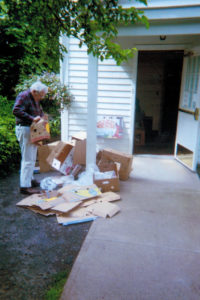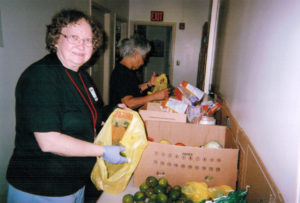August 2, 2021 at 3:33 pm
Why are you talking about having no bread? – Mark 8:17
“You shouldn’t feed this kind of food to these people. If they are hungry enough, they’ll eat anything.”
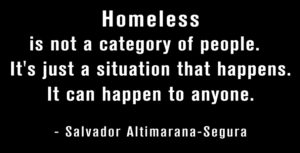

There’s a hunger beyond food that’s expressed in food. And, that’s why feeding is always a kind of miracle.
Food helps the sick and injured when the cook’s intention is incorporated in the “broth”.
Delicious food can be one of the last experiences of physical joy for the dying.
Food and healing go together because when you feed others with integrity, you help them heal.
Sharing food in the food pantry is a sacrament.
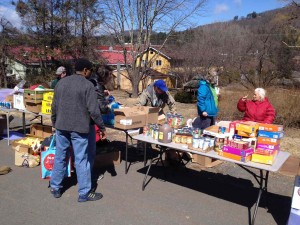
– – – – – – – – – – – – – – –
The food pantry was in the basement of a church right off the village green.
And, I hadn’t even darkened the door in a church in over thirty years; not as a congregant, not as a guest. The closest I came to the inside of a church or syagogue was a graveside burial service for an older relative in a military cemetery outside Culpepper, Virginia. I also attended a Jewish wedding in a hotel in Baltimore.
When I became a pantry volunteer, I found myself in the local interfaith community, a stranger in a foreign land. Right away I noticed that, intermixed with the need for peanut butter, shoppers showed a strong spiritual need for connection, acceptance. This was the hunger beyond food. The closest many shoppers ever got to a church or synagogue service was the pantry line in the basement of the building.
A food pantry is another way to have a religious service. Sharing food is the prayer. Food distribution in the pantry is a spiritual experience.
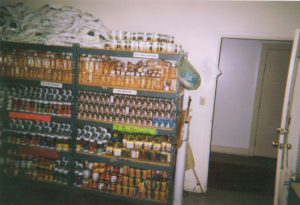
When things really get going, pantry volunteers regularly distribute thousands of pounds of cereal, beans, soup, grapes, lettuce, carrots, and squash, bread, cheese, eggs.
A liturgy is hidden in how we process the shoppers through the barn, the hallway, and the pantry room. The pantry offers Communion to a group of people in the middle of a spiritual journey.
In the beginning, I didn’t see this. Then, I began to get glimmers. I saw things in people’s faces – I didn’t know what. I couldn’t explain it. But I recognized it. I saw an expression, and had an “aha” moment.
This Communion doesn’t require much. Shoppers and volunteers simply sign in at the food pantry door. People came from all different places spiritually and religiously: agnostics, atheists, B’Hais, Buddhists, Christians, Confucians, Jains, Jews, Hindus, Muslims, Russian Orthodox, Shintos, Sikhs, Zoroastrians.
Early on, I saw something in a person’s face but didn’t know what. I couldn’t pinpoint, describe or explain what I saw.
The man who lost what he believed was the last job of his life…
The old woman with her toddler grandson who chose his own apple at every pantry visit…
The senior wearing a baseball cap with “Korean War Veteran” embroidered on the front…
They came through the line and took what they needed for the week: tomatoes, a bag of salad mix, squash, onions, potatoes. They received what they chose with no strings attached. Our nation’s abundance stocked the pantry.
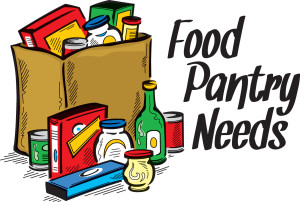
Volunteers distribute food unconditionally to everyone who shops, without exceptions. Hungry people pour through the basement weekly and leave, their arms loaded. Some of them get almost more fresh produce and Bread Alone bread than they can carry.
And, if they can’t carry it, Richard, Robert, Jamie, and Little Mikey (the entire Allen family) help.
This family has a mission. They help get supper from the pantry into people’s cars and on its way to their homes.
Each week I opened the pantry when I unlocked the outside door with a key. The locked building also housed a beautiful sanctuary. As volunteers, we were allowed in the portion of the hallway where the pantry and storeroom were located.
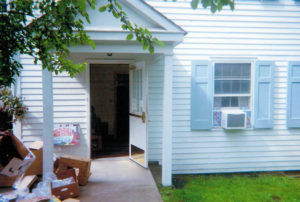
Each turn of the key reminded me that a church with no one in it is just a building.
We encountered faith in the pantry outside the church sanctuary on Wednesday and Thursday afternoons. With little or no religious doctrine, these weekly encounters were as freeform and varied as a faith can be because the State of New York insisted on secular food pantries. I felt our pantry represented civic religion – belief in things without including God. Everyone going through the pantry had a different doctrine.
It was all okay.
The whole thing reminded me of the birthplace of Lyndon B. Johnson at the memorial built in his honor in Johnson City, Texas. After spending time at the memorial, I realized I visited a deeply religious and spiritual place…but it was civic.
There’s room for civic religious beliefs in the pantry. After all, worship can happen in the most varied placees: inside a jail cell, a cemetery, on Facebook, at a family table, a roadside shrine, a person praying on a rug at high noon in a parking lot somewhere, a mountainside, a stream, a hospital room, a monastery.
All it takes is for someone to be alert to what’s happening.
For me, every shopper and volunteer has meaning and is cherished. Each and every one is of profound value. It doesn’t matter whether or not anyone else sees them as successful or beautiful or useful even. Success, beauty, and usefulness doesn’t impact anyone’s worth. Everyone in the pantry is worthy.
That’s what matters.
Looking back on my time in the food pantry, no one else saw any similarity between Communion and the food pantry.
Church members never noticed the most popular service in that building each week fed the hungry at the food pantry in the basement.
And, I didn’t either in the beginning.
Later, when I recognized the face of God, I got it.

Thank you for reading this blog post. Please refer it to your favorite social media network.
Please share it with your friends.
“Let’s Live with Thurman Greco”, the YouTube channel, is a place to stay on top of Thurman’s videos. Subscribe today and never miss a show.
Thanks for subscribing.

Did this quotation interest you? Is it a compellling message for you? If so, maybe you would like to listen to the YouTube interview with Salvador Altimarana-Segura.
This quotation is also on a T-shirt. You can find it at www.thurmangreco.com.
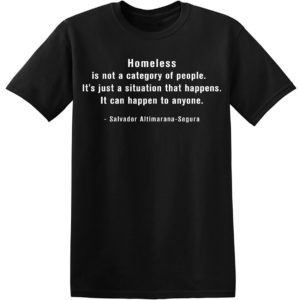


January 26, 2021 at 9:48 pm
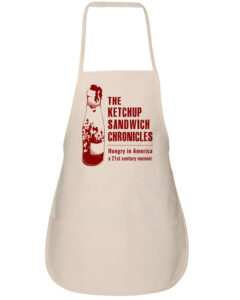
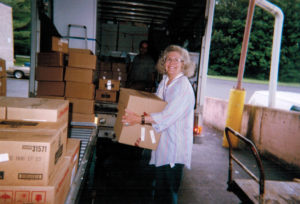
It’s easier than you think.
Step 1:
Choose the food pantry, homeless shelter, school, church, food bank, or soup kitchen to receive the food you collect.
Step 2:
Contact your recipient, and learn what items the hungry people need. Try to be specific. Can they only accept canned food items or can they use frozen and fresh foods? What about pet food?
If they need pet food or food for homeless people, for example, request those items (with specific food item suggestions) at your drive.
Step 3:
Decide how you want to collect the donated food.
The method I prefer is, of course, the one that worked for me several times. I recommend this method:
Gather some large empty grocery bags in good condition.
Attach a letter to each one saying something like:
Dear Neighbor:
“We are having a food drive in this neighborhood. Please fill this bag with food and set it out on your entryway on ………………………….. when it will be picked up between 00:00 and 00:00. Include am and pm to be more specific.
We need the following kinds of food:……………………..
Your donated food will be donated to ……………………………… Thank you for your generosity. If you have any questions, please call…………………………………. Signed…………………………………….”
Set the bags out at every address in the area you selected.
On the appointed date, return to the addresses and pick up the bags of food.
Step 4:
Deliver them to the selected food pantry, homeless shelter, school.
Step 5:
Pat yourself on your back. You did a great job!
My experience with this food drive method is that people respond positively because you give them bags, tell them exactly what food items you need, and return to pick up the food at a specific time on an exact date.
Thank you in advance for all you are doing to feed your neighbors.
Please post this article on your favorite social media network.
Share it with your friends.
Have a wonderful day!
Thurman Greco
www.hungerisnotadisease.com

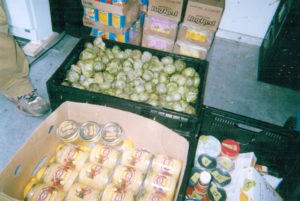
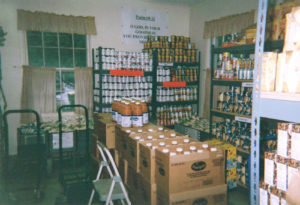
May 6, 2020 at 7:55 pm
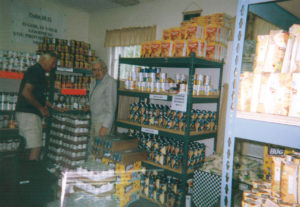
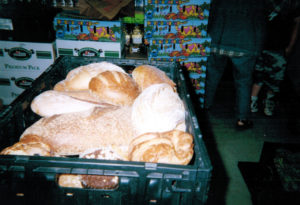
Starving Seniors? Food insecure seniors? Are those terms too harsh?
Let’s ratchet them down: hungry.
Or maybe: food insecure. Yeah, that’s better. It sounds better anyway.
Call it what you want, the event is the same. It’s your grandmother or grandfather (or me…I’m certainly a grandmother) caught in a situation where there’s simply not enough food in the house. They are food insecure.
In these times, we seniors living on Social Security are finding ourselves routinely choosing between food and medicine, food and transportation.
I have two friends who daily hitch rides to the grocery store because their cars don’t work any more. Here, in the middle of this health crisis, they are in a desperate situation not of their making. Everyone is trying to shelter in place, wear face masks and gloves, practice social distancing, and find a friend to help get food.
Walking to a store is totally out for one: her hip and knee replacements won’t allow it. And, we’re not supposed to be out in public anyway.
And, how can a person buy a used car these days anyway? And, when the car gives up the ghost, how will we get to work? Yes, I know lots of seniors who are figuring out ways to bring in $$$.
The issues with seniors and food insecurity are serious because when seniors no longer have $$$ to buy the food they need for nutrition or when they can no longer buy the medicines they need, they become ill and finally end up being cared for by their children or they end up in a nursing home.
I know many stories about:
The senior in Woodstock living on mashed potatoes.
The older woman in Bearsville who ended up in a nursing home when her take-out food pantry cut her off and she couldn’t get to a grocery store.
The older man who lacks $$$ for enough food and is slowly starving.
There is food available:
If they can get to a food pantry or If they can find a pantry offering takeout
If they can sign up for SNAP (food stamps).
If they have the strength to deal with long lines and frazzled volunteers.
=============================
I spoke recently with a retired man I know:
“Richard, do you get SNAP?”
“No.”
“Why, Richard? SNAP is usually easy to get. All you have to do is apply.”
“Well, I’m getting by without it. Let someone else, needier than me, get the $$$ Besides, I hear the lines are outrageous.”
“Richard, think about getting SNAP. This is a benefit you paid for. Why leave $$$ on the table?”
The barriers to SNAP for seniors are great. Seniors resist going to a pantry, soup kitchen, getting SNAP until they simply cannot resist any longer. I know the feeling. People in my age category grew up and entered adulthood feeling that if we worked hard and paid our taxes, we would end up okay. We worked all our lives with this attitude and now that we’re retired…there simply isn’t enough.
When this happens, we feel inadequate and blame ourselves. “I must have done something wrong. Here I am living hand-to-mouth. I don’t even have enough $$$ for food. What did I do wrong?”
We are a whole generation of people blaming ourselves. I feel like we’re really not totally to blame for being food insecure.
I tell myself the rules have changed. This pandemic has shifted everything. Because we’re retired, we’re not in the rules-making game anymore.
Whatever happened to the Grey Panthers?
Thank you for reading this article. Please refer it to your favorite social media network.
Thurman Greco

April 29, 2020 at 11:28 pm

“No Fixed Address” is dedicated to those in our country with no roof over their heads. See your neighbors, your friends, your relatives, in new ways as they describe their daily lives in their own words.
The people in this new book reveal themselves to be both brave and fearless as they go about their activities: work, laundry, children’s homework, appointments. Mostly they live like the rest of us. They just have no roof over their heads.
“No Fixed Address” is my newest book in the Unworthy Hungry series. It’s easy to read and understand. You won’t be bored, not even for a minute.
I hope you’ll order it today. Get an extra copy for a friend!
This book has an extra surprise. When you get a copy, you’ll be making a donation to a good cause. You’ll be fighting hunger and homelessness.
It doesn’t get much better than that!
Thank you for reading this article!
Please forward it to your preferred social media network.
Thurman Greco


March 28, 2020 at 7:34 pm
“Woodstock is completely packed with Coronavirus refugees from Brooklyn. We’re doing more business here in the post office than we have every done. This post office is busier than any Christmas rush has ever been.”
What a day!
I got a call from someone earlier today. “The food pantry is closed, Thurman. How can this happen?” As I went by the Woodstock Library, I saw a sign: “Closed”
The Coronavirus affects us all. We cannot avoid the reality. People jokingly call our community Brooklyn North.
As long as you have a car and money and an apartment and a cell phone and a computer, all you have to worry about is the spread of germs. But, that’s not how it is with everyone. Without a car and money and an apartment and a computer and a call phone, your life tells a different story.
Without those luxuries, your lifeline requires a food pantry and a library.
The library is essential because it’s your ticket to information about food, housing, and anything else you need to find. A library will help you find everything you need to survive. And, while it’s giving you information, a library roof keeps you dry. The walls of the library keep you warm and comfortable while you seek all that you need.
And, of course, the library has one other luxury people don’t talk about much: a bathroom. If you are without food and a roof and a computer and a cell phone, a bathroom is essential.
So, while the Woodstock Reformed Church has closed its doors, most of the food pantries in New York state are figuring out how to get food to people. They are receiving support from the Food Bank.
In fact, the Food Bank of the Hudson Valley reports that volunteers are responding to every emergency request received. This includes food deliveries to seniors, quarantined and high-risk individuals, school back pack programs.
If you can get to a phone, there are a couple of phone numbers you can call. Try 845-399-0376 or 845-633-2120.
Sources tell me that many food pantries and soup kitchens are not closed. I truly hope you can find one.
So, what can we do? Well, for starters, try to contact people you know but seldom see and find out how they are doing. Do they need anything? Is there anything you can do?
Contact food pantries and soup kitchens in your area and see if they need anything. My bet is that they do. My bet is they need food.
Times are serious. Your help is needed!
If you run out of ideas, contact me at thurmangreco@gmail and I’ll send you, free of charge, my three action guides with practical tips for fighting hunger and homelessness.
Thank you for reading this article. Please refer it to your preferred social media network.
Thanks again!
Thurman Greco

March 1, 2020 at 8:34 pm


Well, actually, it isn’t necessarily what. It’s more likely who. The first line of leadership inspiration is the hungry people in the food pantry line. A food pantry really is all about the people grappling with hunger.
But, where did this whole thing actually begin? For me, it all started with Robert F. Kennedy. In 1967, he traveled to Mississippi to see poverty and hunger for what it was. Being a wealthy man from a wealthy family, he actually had no idea.
Down there he saw hunger and poverty for what it was, not what he thought it should be. He saw people, elderly people, adults, children. He saw people with no jobs, no welfare, no surplus commodities, and no food stamps.
If the history books tell this story correctly, it was the children who got to him. He saw the hunger as it was. Seeing children hungry to the point of near starvation, Robert F. Kennedy came face-to-face with malnutrition.
Robert F. Kennedy was both moved and angry.
There is a book out there telling the story of their hunger. You may or may not ever have heard about this book. “So Rich, So Poor” was written by Peter Edelman.
In reading about Robert F. Kennedy, I read a paragraph which has meaning for me:
“All of us, from the wealthiest to the young children that I have seen in this country, in this year, bloated by starvation – we all share one precious possession, and that is the name American.
“It is not easy to know what that means.
“But in part to be an American means to have been an outcast and a stranger, to have come to the exiles’ country, and to know that he who denies the outcast and stranger still amongst us, he also denies America.”
Those words resonate with me. They may mean nothing to you. But, whether or not they have meaning for you, they are powerful words and they tell a story I see in the food pantry line.
I thank you for reading this blog post. I thank you for your interest in fighting hunger. I know that distributing food in a food pantry is not going to do away with hunger.
But, this I do know: Distributing food in a food pantry will keep the shoppers in that line from starvation for three days.
This is all I can do. This has to be enough until a better option comes along.
Thurman Greco
Please refer this post to your preferred social media network.

